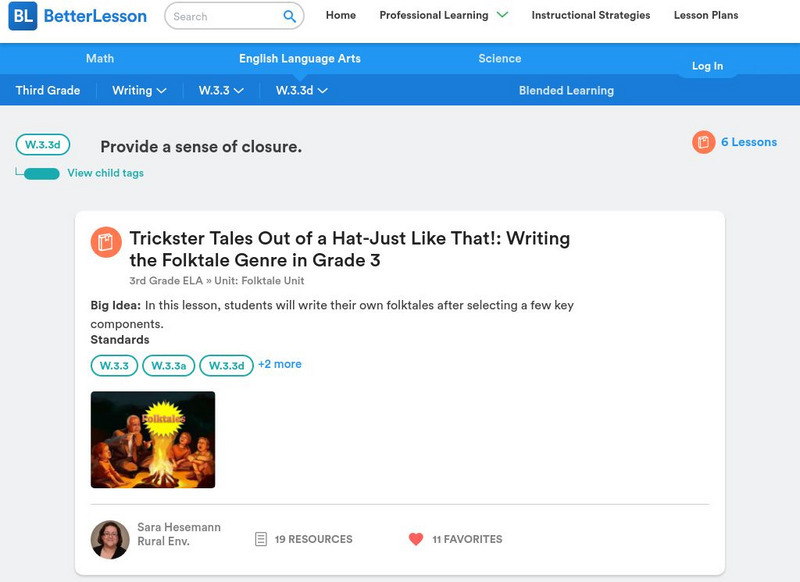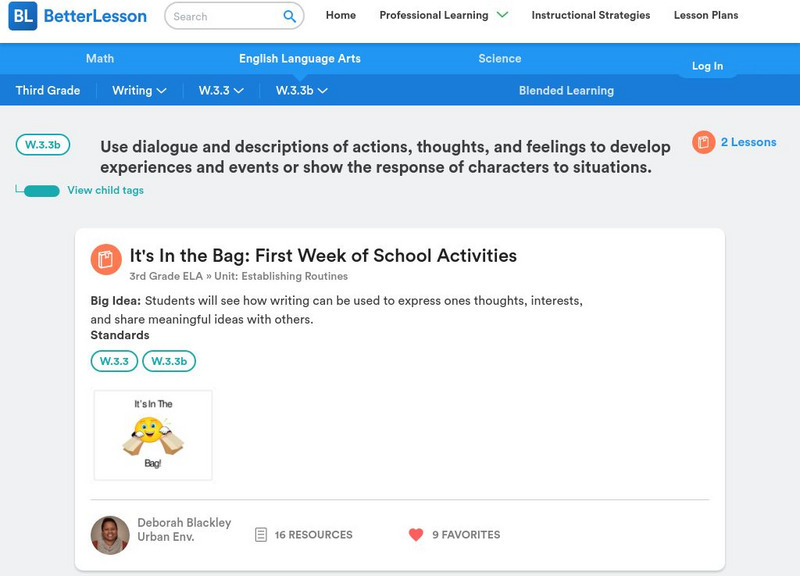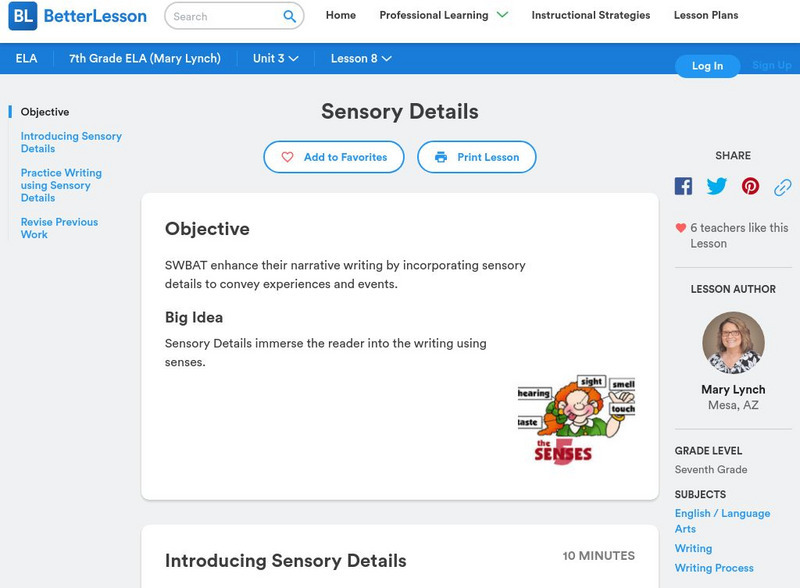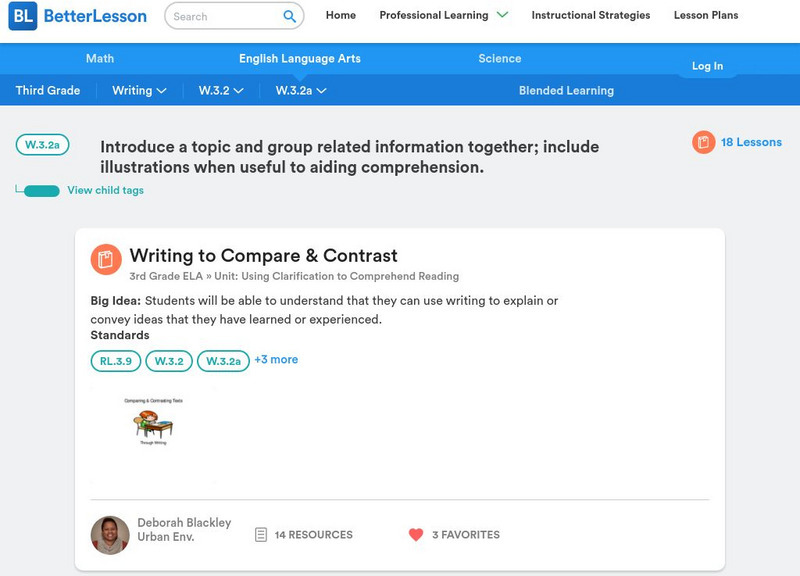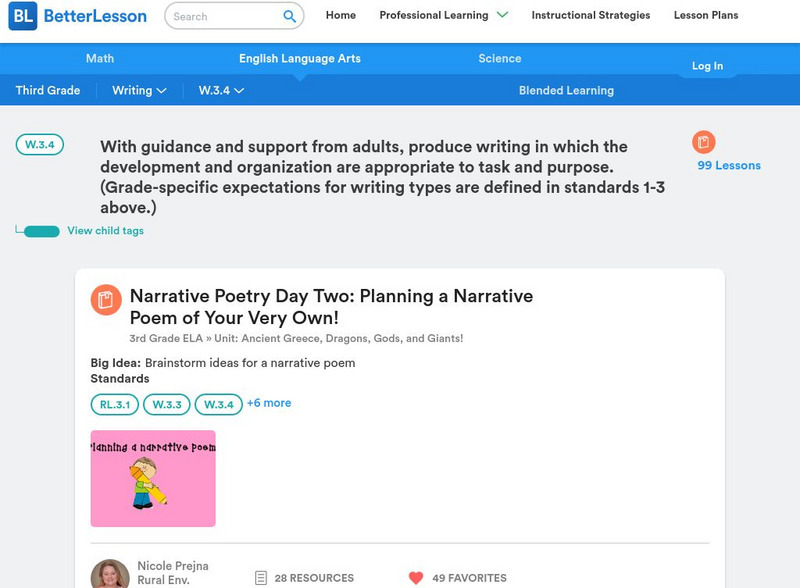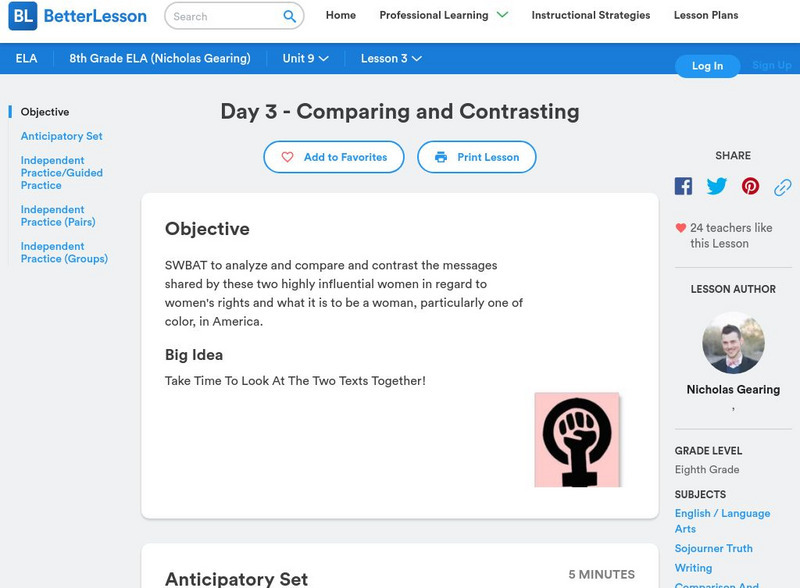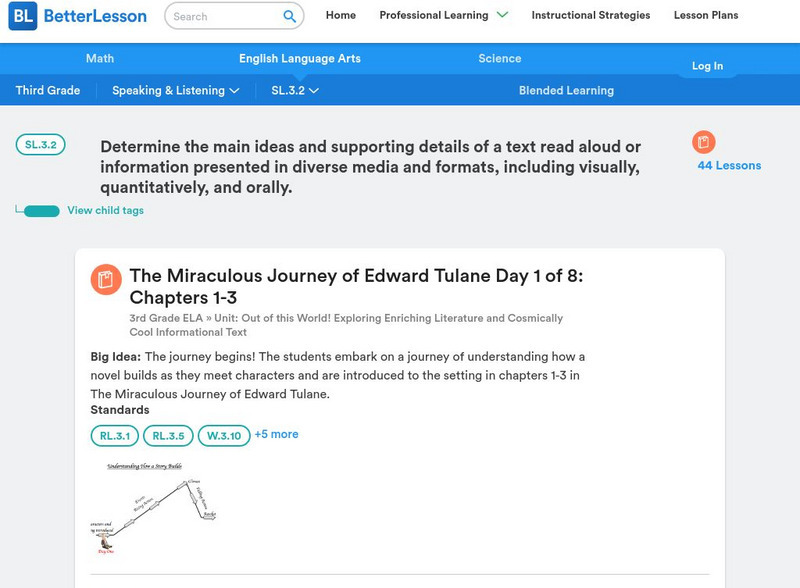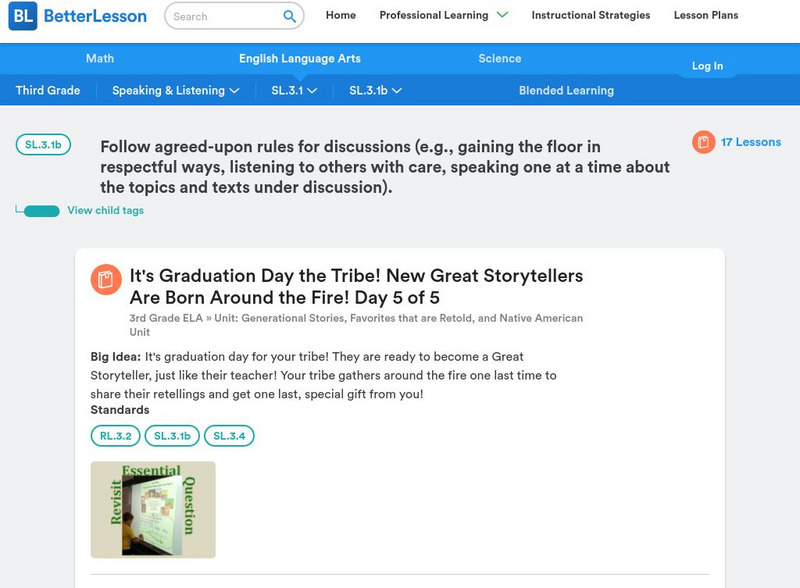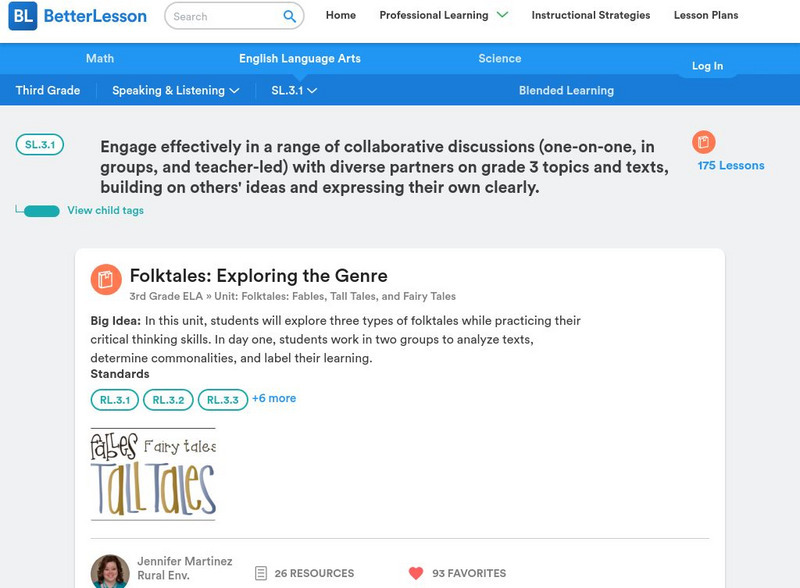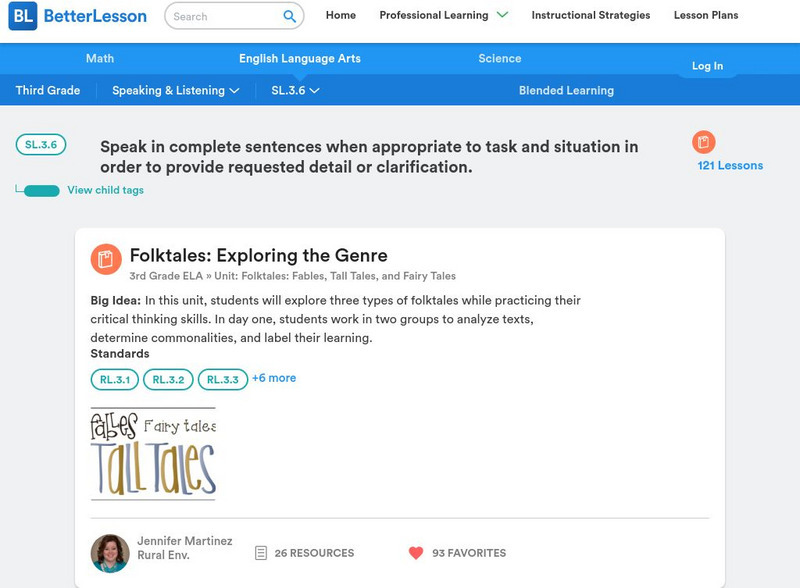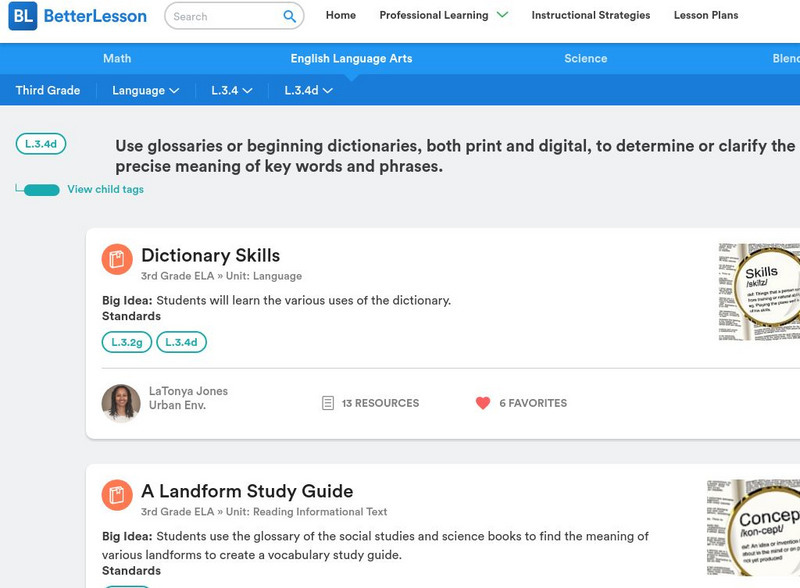Hi, what do you want to do?
Better Lesson
Better Lesson: W.3.3d: Provide a Sense of Closure
Links to 6 lessons and activities that build student skills in standard W.3.3d: Provide a sense of closure.
Better Lesson
Better Lesson: W.3.3.b: Use Dialogue and Descriptions of Actions
Links to 2 lessons and activities that build student skills in standard W.3.3.b: Write Narratives to develop real or imagined experiences or events using effective technique, descriptive details, and clear event sequences.
Better Lesson
Better Lesson: What Is Plagiarism?
In this lesson, students write summaries of researched information in their own words and quote text accurately.
Better Lesson
Better Lesson: W.3.2c: Use Linking Words and Phrases to Connect Ideas
Links to 7 lessons and activities that build student skills in standard W.3.2c: Use linking words and phrases (e.g., also, another, and, more, but) to connect ideas within categories of information.
Better Lesson
Better Lesson: W.3.3: Write Narratives to Develop Real or Imagined Experiences
Links to 47 lessons and activities that build student skills in standard W.3.3: Write Narratives to develop real or imagined experiences or events using effective technique, descriptive details, and clear event sequences.
Better Lesson
Better Lesson: W.3.2d: Provide a Concluding Statement or Section
Links to 8 lessons and activities that build student skills in standard W.3.2d: Provide a concluding statement or section.
Better Lesson
Better Lesson: Sensory Details
Middle schoolers will learn how to enhance their narrative writing by incorporating sensory details to convey experiences and events. A power point presentation on sensory details is included.
Better Lesson
Better Lesson: W.3.2b: Develop the Topic With Facts, Definitions, and Details
Links to 12 lessons and activities that build student skills in standard W.3.2b: Develop the topic with facts, definitions, and details.
Better Lesson
Better Lesson: W.3.2a: Introduce a Topic and Group Related Information
Links to 18 lessons and activities that build student skills in standard W.3.2a: Introduce a topic and group related information together; include illustrations when useful to aiding comprehension.
Better Lesson
Better Lesson: Jigsaw Lit Circle Discussions
Students will participate in a discussion of a text by preparing for a literature circle. This lesson is an example of the Jigsaw Method. A student video and grading rubric are provided.
Better Lesson
Better Lesson: Analyzing Literary Devices With a Written Discussion
Students will be able to analyze literary devices by participating in a written discussion. This activity is called "Pass the Paper". Students pass a sheet of paper around the room, with each student adding on. It's just a different way...
Better Lesson
Better Lesson: W.3.8: Recall Information From Experiences or Gather Information
Links to 75 lessons and activities that build student skills in standard W.3.8: Recall information from experiences or gather information from print and digital sources, take brief notes on sources and sort evidence into provided...
Better Lesson
Better Lesson: W.3.4: Produce Writing Appropriate to Task and Purpose
Links to 99 lessons and activities that build student skills in standard W.3.4: With guidance and support from adults, produce writing in which the development and organization are appropriate to task and purpose.
Better Lesson
Better Lesson: What the Heck Is That? Inferring the Purpose of an Object
In this lesson, 5th graders use their prior knowledge and inference skills to determine uses of unfamiliar objects. They participate in group discussions and analyze the key information they have in order to reach conclusions.
Better Lesson
Better Lesson: Day 3 Comparing and Contrasting
Learners will analyze and compare and contrast the messages shared by two highly influential women in regard to women's rights and what it is to be a woman, particularly one of color, in America. The texts that will be compared are "Aint...
Better Lesson
Better Lesson: Sl.3.2: Determine the Main Ideas and Supporting Details of a Text
Links to 44 lessons and activities that build student skills in standard SL.3.2: Determine the main ideas and supporting details of a text read aloud or information presented in diverse media and formats, including visually,...
Better Lesson
Better Lesson: Sl.3.1b: Follow Agreed Upon Rules for Discussion
Links to 17 lessons and activities that build student skills in standard SL.3.1b: Follow agreed-upon rules for discussion (e.g., gaining the floor in respectful ways, listening to others with care, speaking one at a time about the topics...
Better Lesson
Better Lesson: Sl.3.1: Engage Effectively in a Range of Collaborative Discussions
Links to 175 lessons and activities that build student skills in standard SL.3.1: Engage effectively in a range of collaborative discussions (one-on-one, in groups, and teacher-led) with diverse partners on grade 3 topics and texts,...
Better Lesson
Better Lesson: Sl.3.6: Speak in Complete Sentences
Links to 121 lessons and activities that build student skills in standard SL.3.6: Speak in complete sentences when appropriate to task and situation in order to provide requested detail or clarification.
Better Lesson
Better Lesson: L.3.2a: Capitalize Appropriate Words in Tites
Links to a lesson that builds student skills in standard L.3.2a: Capitalize appropriate words in titles.
Better Lesson
Better Lesson: L.3.5b: Identify Real Life Connections Between Words and Their Use
Links to 6 lessons and activities that build student skills in standard L.3.5b: Identify real-life connections between words and their use (e.g., describe people who are friendly or helpful).
Better Lesson
Better Lesson: L.3.5a: Distinguish Literal and Nonliteral Meanings of Words
Links to 18 lessons and activities that build student skills in standard L.3.5a: Distinguish the literal and nonliteral meanings of words and phrases in context (e.g., take steps).
Better Lesson
Better Lesson: L.3.2a: Choose Words and Phrases for Effect
Links to 4 lessons and activities that build student skills in standard L.3.3a: Choose words and phrases for effect.
Better Lesson
Better Lesson: L.3.4d: Use Glossaries or Dictionaries to Determine Meaning
Links to 2 lessons and activities that build student skills in standard L.3.4d: Use glossaries or beginning dictionaries, both print and digital, to determine or clarify the precise meaning of key words and phrases.





